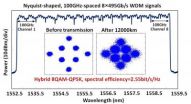(Press-News.org) Philadelphia, PA, March 12, 2013 – Cognitive impairments are disabling for individuals with schizophrenia, and no satisfactory treatments currently exist. These impairments affect a wide range of cognition, including memory, attention, verbal and motor skills, and IQ. They appear in the earliest stages of the disease and disrupt or even prevent normal day-to-day functioning.
Scientists are exploring a variety of strategies to reduce these impairments including "exercising the brain" with specially designed computer games and medications that might improve the function of brain circuits.
In this issue of Biological Psychiatry, Dr. Mera Barr and her colleagues at University of Toronto provide new evidence that stimulating the brain using repetitive transcranial magnetic stimulation (rTMS) may be an effective strategy to improve cognitive function.
"In a randomized controlled trial, we evaluated whether rTMS can improve working memory in schizophrenia," said Barr and senior author Dr. Zafiris Daskalakis. "Our results showed that rTMS resulted in a significant improvement in working memory performance relative to baseline."
Transcranial magnetic stimulation is a non-invasive procedure that uses magnetic fields to stimulate nerve cells. It does not require sedation or anesthesia and so patients remain awake, reclined in a chair, while treatment is administered through coils placed near the forehead.
"TMS can have lasting effects on brain circuit function because this approach not only changes the activity of the circuit that is being stimulated, but it also may change the plasticity of that circuit, i.e., the capacity of the circuit to remodel itself functionally and structurally to support cognitive functions," explained Dr. John Krystal, Editor of Biological Psychiatry.
Previous work has shown that rTMS improves working memory in healthy individuals and a recent open-label trial showed promising findings for verbal memory in schizophrenia patients. This series of findings led this study to determine if high frequency rTMS could improve memory in individuals with schizophrenia.
They recruited medicated schizophrenia patients who completed a working memory task before and after 4 weeks of treatment. Importantly, this was a double-blind study, where neither the patients nor the researchers knew who was receiving real rTMS or a sham treatment that was designed to entirely mimic the procedure without actually delivering brain stimulation.
rTMS not only improved working memory in patients after 4 weeks, but the improvement was to a level comparable to healthy subjects. These findings suggest that rTMS may be a novel, efficacious, and safe treatment for working memory deficits in schizophrenia.
In 2008, rTMS was FDA-approved to treat depression for individuals who don't respond to pharmacotherapy. The hope is that additional research will replicate these findings and finally provide an approved treatment for cognitive impairments in schizophrenia.
The authors concluded: "Working memory is an important predictor of functional outcome. Developing novel treatments aimed at improving these deficits may ultimately translate into meaningful changes in the lives of patients suffering from this debilitating disorder."
###The article is "Can Repetitive Magnetic Stimulation Improve Cognition in Schizophrenia? Pilot Data from a Randomized Controlled Trial" by Mera S. Barr, Faranak Farzan, Tarek K. Rajji, Aristotle N. Voineskos, Daniel M. Blumberger, Tamara Arenovich, Paul B. Fitzgerald, and Zafiris J. Daskalakis (doi: 10.1016/j.biopsych.2012.08.020). The article appears in Biological Psychiatry, Volume 73, Issue 6 (March 15, 2013), published by Elsevier.
Notes for Editors
Full text of the article is available to credentialed journalists upon request; contact Rhiannon Bugno at +1 214 648 0880 or Biol.Psych@utsouthwestern.edu. Journalists wishing to interview the authors may contact Zafiris Daskalakis at +416 535 8501 x 34319 or Jeff_Daskalakis@camh.net.
The authors' affiliations, and disclosures of financial and conflicts of interests are available in the article.
John H. Krystal, M.D., is Chairman of the Department of Psychiatry at the Yale University School of Medicine and a research psychiatrist at the VA Connecticut Healthcare System. His disclosures of financial and conflicts of interests are available here.
About Biological Psychiatry
Biological Psychiatry is the official journal of the Society of Biological Psychiatry, whose purpose is to promote excellence in scientific research and education in fields that investigate the nature, causes, mechanisms and treatments of disorders of thought, emotion, or behavior. In accord with this mission, this peer-reviewed, rapid-publication, international journal publishes both basic and clinical contributions from all disciplines and research areas relevant to the pathophysiology and treatment of major psychiatric disorders.
The journal publishes novel results of original research which represent an important new lead or significant impact on the field, particularly those addressing genetic and environmental risk factors, neural circuitry and neurochemistry, and important new therapeutic approaches. Reviews and commentaries that focus on topics of current research and interest are also encouraged.
Biological Psychiatry is one of the most selective and highly cited journals in the field of psychiatric neuroscience. It is ranked 5th out of 129 Psychiatry titles and 16th out of 243 Neurosciences titles in the Journal Citations Reports® published by Thomson Reuters. The 2011 Impact Factor score for Biological Psychiatry is 8.283.
About Elsevier
Elsevier is a world-leading provider of scientific, technical and medical information products and services. The company works in partnership with the global science and health communities to publish more than 2,000 journals, including The Lancet and Cell, and close to 20,000 book titles, including major reference works from Mosby and Saunders. Elsevier's online solutions include ScienceDirect, Scopus, Reaxys, ClinicalKey and Mosby's Nursing Suite, which enhance the productivity of science and health professionals, and the SciVal suite and MEDai's Pinpoint Review, which help research and health care institutions deliver better outcomes more cost-effectively.
A global business headquartered in Amsterdam, Elsevier employs 7,000 people worldwide. The company is part of Reed Elsevier Group PLC, a world-leading provider of professional information solutions in the Science, Medical, Legal and Risk and Business sectors, which is jointly owned by Reed Elsevier PLC and Reed Elsevier NV. The ticker symbols are REN (Euronext Amsterdam), REL (London Stock Exchange), RUK and ENL (New York Stock Exchange).
Tickling the brain with magnetic stimulation improves memory in schizophrenia
2013-03-12
ELSE PRESS RELEASES FROM THIS DATE:
Antibiotic-resistant strain of E. coli increasing among older adults and residents of nursing homes
2013-03-12
Antibiotic-resistant Escherichia coli (E. coli) continues to proliferate, driven largely by expansion of a strain of E. coli know as sequence type ST131. A new study points to hospitals and long-term care facilities (LTCF) as settings in which this antibiotic-resistant strain is increasingly found. The study is published in the April issue of Infection Control and Hospital Epidemiology, the journal of the Society for Healthcare Epidemiology of America.
E. coli is the most common gram-negative pathogen, causing both gastrointestinal disease and extraintestinal infections ...
Infants prefer individuals who punish those not like themselves, Yale researchers find
2013-03-12
Infants as young as nine months old prefer individuals who punish those who are not like them, and this seemingly innate mean streak grows stronger in the next five months of life, a study by researchers at Yale University has found.
Babies, like adults, prefer individuals who like the same things they do. A new study reports that they want individuals who share their tastes to be treated well by others, but want those whose tastes differ from their own to be treated badly. The study of 200 nine- and 14-month-old infants was published online in Psychological Science, ...
New distance record for 400 Gb/s data transmission
2013-03-12
As network carriers debate the next Ethernet standard—and whether transmission speeds of 400 gigabit per second or 1 terabit per second should be the norm—engineers are working on new measures to squeeze next-generation performance out of current-generation systems.
To that end, a team from AT&T has devised a new patent pending technique enabling tuning of the modulation spectral efficiency, which allows, for the first time, 400 Gb/s signals to be sent over today's 100 gigahertz-grid optical networks over ultra-long distances. Spectral efficiency is the information rate ...
Job burnout can severely compromise heart health
2013-03-12
Americans work longer hours, take fewer vacation days, and retire later than employees in other industrialized countries around the globe. With such demanding careers, it's no surprise that many experience job burnout — physical, cognitive, and emotional exhaustion that results from stress at work. Researchers have found that burnout is also associated with obesity, insomnia, and anxiety.
Now Dr. Sharon Toker of Tel Aviv University's Faculty of Management and her fellow researchers — Profs. Samuel Melamed, Shlomo Berliner, David Zeltser and Itzhak Shpira of TAU's Sackler ...
Ultra-high-speed optical communications link sets new power efficiency record
2013-03-12
Ultrafast supercomputers that operate at speeds 100 times faster than current systems are now one step closer to reality. A team of IBM researchers working on a U.S. Defense Advanced Research Projects Agency (DARPA)-funded program have found a way to transmit massive amounts of data with unprecedentedly low power consumption.
The team will describe their prototype optical link, which shatters the previous power efficiency record by half at the Optical Fiber Communication Conference and Exposition/National Fiber Optic Engineers Conference (OFC/NFOEC) in Anaheim, Calif. ...
New automated process simplifies alignment and splicing of multicore optical fibers
2013-03-12
New multicore optical fibers have many times the signal-carrying capacity of traditional single-core fibers, but their use in telecommunications has been severely restricted because of the challenge in splicing them together-- picture trying to match up and connect two separate boxes of spaghetti so that all of the noodles in each box are perfectly aligned. Now, a new splicing technique offers an automated way to do just that, with minimal losses in signal quality across the spliced sections. The method will be described at the Optical Fiber Communication Conference and ...
Penn study: Financial incentives affect prostate cancer treatment patterns
2013-03-12
Philadelphia - According to a new study by researchers at the Perelman School of Medicine at the University of Pennsylvania, prostate cancer patients of urologists who own expensive radiation equipment are more likely to receive radiation treatment in lieu of surgery than patients treated by urologists without an ownership stake in the equipment. The study, now available online in the Journal of Urology, found that integrated prostate cancer centers (IPCCs), where urology and radiation oncology practices are combined, use expensive radiation-based treatments at higher rates ...
Mystery of 'zombie worm' development unveiled
2013-03-12
How do bone-eating worms reproduce? A new study by Norio Miyamoto and colleagues from the Japan Agency for Marine-Earth Science and Technology sheds light on this question through a detailed observation of the postembryonic development and sexual maturation of Osedax worms, also known as "zombie worms." These worms typically inhabit vertebrate bones on the seafloor. The study is published online in Springer's journal Naturwissenschaften - The Science of Nature.
Osedax is Latin for "bone-devourer," which refers to how the worms bore into the bones of whale carcasses to ...
Neural 'synchrony' may be key to understanding how the human brain perceives
2013-03-12
Despite many remarkable discoveries in the field of neuroscience during the past several decades, researchers have not been able to fully crack the brain's "neural code." The neural code details how the brain's roughly 100 billion neurons turn raw sensory inputs into information we can use to see, hear and feel things in our environment.
In a perspective article published in the journal Nature Neuroscience on Feb. 25, 2013, biomedical engineering professor Garrett Stanley detailed research progress toward "reading and writing the neural code." This encompasses the ability ...
4 dinosaur egg species identified in Lleida
2013-03-12
A study headed by the Miquel Crusafont Catalan Palaeontology Institute has for the first time documented detailed records of dinosaur egg fossils in the Coll de Nargó archaeological site in Lleida, Spain. Up until now, only one type of dinosaur egg had been documented in the region.
The archaeological site in Coll de Nargó containing dinosaur eggs lies some 8 kilometres to the west of the town that bears the same name in the province of Lleida. This region is home to different types of geological formations, including the Areniscas de Arén Formation and the Tremp Formation, ...






